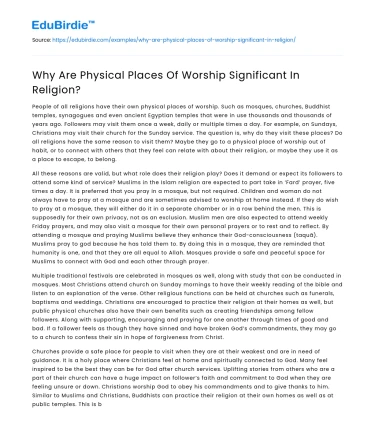People of all religions have their own physical places of worship. Such as mosques, churches, Buddhist temples, synagogues and even ancient Egyptian temples that were in use thousands and thousands of years ago. Followers may visit them once a week, daily or multiple times a day. For example, on Sundays, Christians may visit their church for the Sunday service. The question is, why do they visit these places? Do all religions have the same reason to visit them? Maybe they go to a physical place of worship out of habit, or to connect with others that they feel can relate with about their religion, or maybe they use it as a place to escape, to belong.
All these reasons are valid, but what role does their religion play? Does it demand or expect its followers to attend some kind of service? Muslims in the Islam religion are expected to part take in ‘Fard’ prayer, five times a day. It is preferred that you pray in a mosque, but not required. Children and woman do not always have to pray at a mosque and are sometimes advised to worship at home instead. If they do wish to pray at a mosque, they will either do it in a separate chamber or in a row behind the men. This is supposedly for their own privacy, not as an exclusion. Muslim men are also expected to attend weekly Friday prayers, and may also visit a mosque for their own personal prayers or to rest and to reflect. By attending a mosque and praying Muslims believe they enhance their God-consciousness (taquā). Muslims pray to god because he has told them to. By doing this in a mosque, they are reminded that humanity is one, and that they are all equal to Allah. Mosques provide a safe and peaceful space for Muslims to connect with God and each other through prayer.
Save your time!
We can take care of your essay
- Proper editing and formatting
- Free revision, title page, and bibliography
- Flexible prices and money-back guarantee
Multiple traditional festivals are celebrated in mosques as well, along with study that can be conducted in mosques. Most Christians attend church on Sunday mornings to have their weekly reading of the bible and listen to an explanation of the verse. Other religious functions can be held at churches such as funerals, baptisms and weddings. Christians are encouraged to practice their religion at their homes as well, but public physical churches also have their own benefits such as creating friendships among fellow followers. Along with supporting, encouraging and praying for one another through times of good and bad. If a follower feels as though they have sinned and have broken God’s commandments, they may go to a church to confess their sin in hope of forgiveness from Christ.
Churches provide a safe place for people to visit when they are at their weakest and are in need of guidance. It is a holy place where Christians feel at home and spiritually connected to God. Many feel inspired to be the best they can be for God after church services. Uplifting stories from others who are a part of their church can have a huge impact on follower’s faith and commitment to God when they are feeling unsure or down. Christians worship God to obey his commandments and to give thanks to him. Similar to Muslims and Christians, Buddhists can practice their religion at their own homes as well as at public temples. This is because it is a way of life, of which they should be practicing at all times, not only when meditating or during worship at a temple.
By meditating and worshipping at temples, Buddhists connect with others, which can be uplifting. They may gain a sense of belonging. Buddhists visit temples when something that they are grateful for in life that is important happens, as well as on full moon days and festivals. The temples are designed to create or inspire inner and outer peace. Buddhists who want to practice their religion more strictly become a part of communities and live in monasteries becoming nuns and monks. They commit their absolute whole lives to their religion. The monasteries the monks and nuns live in contain meditation cells and living quarters. Buddhist temples are quiet and calming places that Buddhists can meditate and worship in peace without the interruptions of the outside world, enabling them to pay their full respect to Buddha. What has been discovered about the three religions researched and explored, is that although people may visit physical places out of habit or because they feel forced to, there are also more meaningful reasons as to why they visit these places.
These reasons are fairly similar for all of the three religions. People attend services at physical places of worship to connect with others who follow their religion. Followers are uplifted and inspired by those who attend the same services. The other reason is, the churches, mosques and Buddhist temples provide an escape from the outside world where they can focus solely on their religion. The physical places of worship are safe and homely places that followers can feel as though they belong in.






 Stuck on your essay?
Stuck on your essay?

